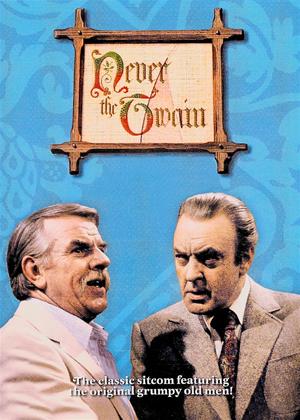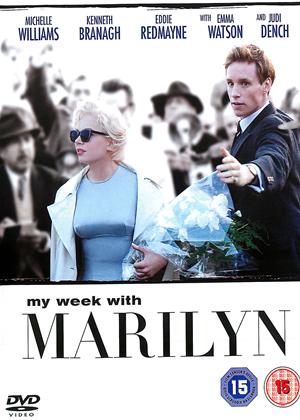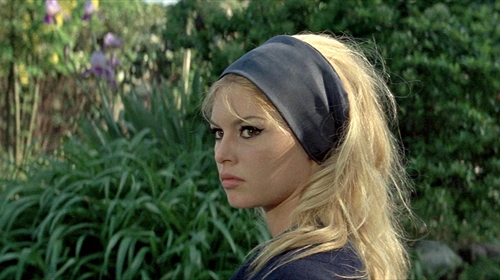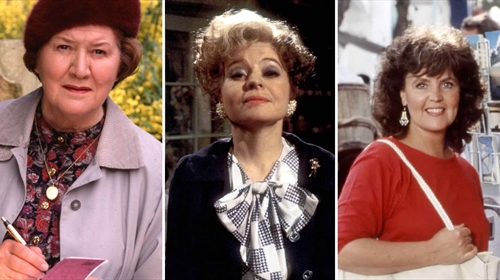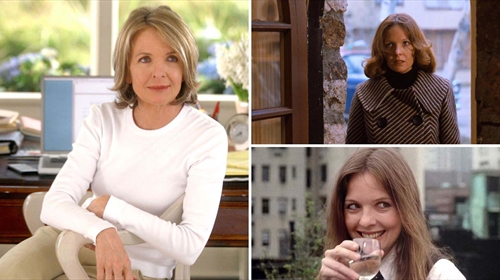Shirley Anne Field and Ryan O'Neal passed away within two days of each other. In linked articles, Cinema Paradiso remembers two performers whose stars burned brightly, if all too briefly.
Shirley Anne Field and Ryan O'Neal were born five years apart. Coming from markedly different backgrounds, they each rather drifted into acting and enjoyed a brief period - she at the start of the 1960s, he at the turn of the 1970s - when one success followed another. As Cinema Paradiso discovers, however, neither quite fulfilled their potential, as the media became more interested in their private lives than in their performances. This is Shirley Anne's story.
Nobody's Child
The third of four children, Shirley Anne Field was born Shirley Broomfield in Forest Gate, Essex on 27 June 1936. Despite the protests of her lorry driver father, her movie-mad mother named her after Shirley Temple, just as sister Sonny had been named after Olympic ice skater-turned-actress, Sonja Henie. Siblings Joy and Guy completed the family, which lived a hand-to-mouth existence, with their father resorting to desperate measures like stealing the balcony carpet from the local Odeon in order to put food on the table. In later life, Field recalled him leaning out of his cab and saying to her when she was three years old, 'Good job you're funny, girl, 'cause you ain't got anything else!'
Everything changed during the Second World War, however, when the house was damaged several times during the Blitz. Sonny and Joy were evacuated, but Shirley Anne and Guy were too young to go into the country and were sent to a children's home in Woking. In 1942, the six year-old Shirley Anne was dispatched to the National Children's Home at Edgworth in Lancashire, which was run by Methodist Sisters. It was only after she protested at being alone that Guy was sent to join her. But he was billeted in another building and Field later revealed that she had been molested by one of the Sisters.
When she was 10, Shirley Anne was transferred to an institution in Blackburn so she could attend Blakey Moor School For Girls. While there, she received a parcel from her mother of 27 hand-stitched dresses of different sized so that she could wear them as she grew up. She was only allowed to keep one, however, with the rest being given to older girls. Eventually, she learned that her mother had remarried an American serviceman and had left the country. Her father also married again, but her parents only visited her once each for the entire time she was up north.
After two more years in Bolton, the 15 year-old Shirley Anne was relocated to a hostel in north London. While training to be a shorthand-typist, she lived with a retired US Marines general named Victor, who opened his home to young women. Although Field admitted that his motives weren't always entirely philanthropical, she invited him to live in her flat when he fell ill.
During this period, Shirley Anne dreamed of becoming a model or an actress so that her mother would see her picture and get back in touch. Instead, a GI she encountered at a dance hall persuaded her to enter the Coronation Queen of Great Britain beauty contest. Much to her surprise, she won the £250 first prize and made special appearances at USAF bases across Britain. On returning to the capital, she worked for a period as a magician's assistant at Battersea Funfair.
Shirley Anne's brush with fame seemed over when she joined British Gas as a typist. But she was asked to perch on a gas cooker for an advertisement and enjoyed the experience so much that she enrolled at the Lucie Clayton Model Agency, which ran its own charm school. She was soon posing for lingerie ads, as well as pin-up shots for popular magazines like Reveille and Titbits. Despite insisting in later interviews that she sought fame to reconnect with her mother, she once divulged that she had changed her name to Field 'because I didn't want "Broomfield" up in lights - my family had rejected me'.
Special Young Lady
While working as a model, Shirley Anne Field was spotted by director Val Guest, who asked if she wanted to become an actress. He arranged for her to join the Bill Watts Agency For Special Young Ladies. The 22 year-old Joan Collins was his best-known client and Field was bent on emulating her 'because she had a pink sports car, lived in Hollywood and earned £120 a week!' She didn't enjoy being a starlet, however, as she found being scantily clad and saddled with the odd line of dismal dialogue as demeaning as being constantly groped on set. As she later lamented, 'It's a horrible experience being a teenager in the film industry: you're exposed to all the wrong influences. It was a very predatory world, you were always at risk.'

Cinema Paradiso users can keep their eyes peeled for an often uncredited Field in a variety of British pictures dating from Muriel Box's Simon and Laura (1955). Her characters weren't even identified in J. Lee Thompson's Yield to the Night or Michael McCarthy's It's Never Too Late (both 1956). But she graduated to being Young Woman on Aeroplane in Wendy Toye's All For Mary, Pretty Girl and Girl in Night Club in Val Guest's 'It's a Wonderful World' and The Weapon, Girl at Roulette Table in Ken Annakin's Loser Takes All, Young Lady in Roy Kellino's The Silken Affair, and Waitress in Café in Maurice Elvey's Dry Rot (all 1956).
Field reunited with J. Lee Thompson to essay Redhead in the J.B. Priestley jaunt, The Good Companions. Moreover, for the first time since she was cast as Miss Carter in Guy Green's Lost (1955), she landed a named role as Susan in Don Chaffey's The Flesh Is Weak. This tale of Soho pimping was followed by Hugo Fregonese's Seven Thunders (both 1957), in which Field played a prostitute in wartime Marseille. She was also unnamed as a passenger in Ralph Thomas's comedy, Upstairs and Downstairs. Years later, Field would reflect, 'I hated being "the special girl" picked out to look glamorous, going out and saying your lines then going home on the workman's bus.' But her fortunes changed after she took her first substantial role, as Angela Banks in Arthur Crabtree's Horrors of the Black Museum (1959), in which she discovers that her fiancé (Graham Curnow) has been doing the bidding of the journalist and crime writer Edmond Bancroft (Michael Gough), who is obsessed with a collection of criminous curios at Scotland Yard.
A Year to Remember
By the end of 1959, the 23 year-old Field was ready to quit films, as she was confused and low on confidence. 'I felt like a piece of meat,' she remembered towards the end of her life, 'just being picked for the way you looked and the shape you were. I felt exploited but I didn't know what else I could do. I didn't know that I [was attractive]. I'd been invisible all my childhood until I was 15. When people used to shout out I couldn't believe it.'

The new year began with a chance to work with a genuine Hollywood legend in director Stanley Donen, who cast her alongside Yul Brynner in Once More, With Feeling!, which proved to be the final film of Kay Kendall, who died of leukaemia at the age of 32 before it was released. But Field was hardly on screen and had to accept another minor support as Iris Collins in George Pollack's boxing comedy, And the Same to You. She next had to put up with her name being misspelt as Shirley Ann Field in Michael Powell's Peeping Tom (all 1960). At the time, this harrowing treatise on voyeurism was slated by the press and hamstrung the director's career, as we saw in The Instant Expert's Guide to Michael Powell and Emeric Pressburger. But the role of Diane Ashley - who drives director Arthur Baden (Esmond Knight) bonkers on the set of the banal comedy that Mark Lewis (Carl Boehm) is photographing - did Field no harm at all, as it poked fun at the kind of bit parts she had been enduring for the last five years.
In fact, she had been cast at the start of 1960 by Lindsay Anderson opposite Albert Finney in a Royal Court production of Harry Cookson's play, The Lily White Boys. Anderson was amused by the fact that she had to ask for time off to record 'It's Legal', the suggestive song that John Barry had composed for her character, Dodo, to sing to aspiring rocker, Dave (Adam Faith), in Edmond T. Gréville's Beat Girl. Her efforts would appear on the first ever soundtrack album for a UK film. But this proved to be a detour, as Field was about to become the poster girl of the British New Wave.
Buoyed by her work at the Royal Court, Field auditioned for Tony Richardson's screen adaptation of John Osborne's The Entertainer, which had premiered at the Royal Court in 1957. Seeing 500 hopefuls packed into a small room looking exactly like her, Field slipped into a dressing-room, let down her ponytail and removed her make-up so she stood out. By all accounts, she was leaving the stage when Richardson spotted a scuff on the heel of her shoe. As she told Cinema Retro, he called after her: '"Can you do those lines in a Northern accent?" I turned around immediately and said (in a Northern accent), "Bloody hell, I've spent four years learning to talk properly and now you're asking me to do this". He looked up and said, "Come back here" and I said (again in a Northern accent), "Well, if you want me to, but I'm not keen on it, I'll have you know."'
The brashness paid off and Field was cast as Tina Lapford, the beauty queen who is seduced by fading music-hall comedian Archie Rice (Laurence Olivier) after he comperes a pageant in Morecambe. The pair didn't hit it off, however, with Olivier being less than impressed when he asked Field about her favourite actresses and she had cited his soon-to-be ex-wife, Vivien Leigh, and Marilyn Monroe, with whom he had struggled to connect during the making of The Prince and the Showgirl (1957), an episode that is recalled in Simon Curtis's My Week With Marilyn (2011).
Determined to establish a rapport, Olivier had forced Field to attend the screening of the day's rushes. She had tended to avoid these, as her previous parts had been so negligible. However, she went along and was touched by the round of applause she received for the scene in which Tina and Archie talk in bed and the pair had left the room arm in arm, as Olivier crowed, 'No improvement needed there, is there young lady?'
Field politely declined his invitation to join the Old Vic company, however, as she didn't see herself as a stage actress. Instead, she remained in a social realist vein to reunite with Albert Finney (who had made his screen debut as Archie's son, Mick) on Karel Reisz's interpretation of Alan Sillitoe's Nottingham novel, Saturday Night and Sunday Morning (1960). As Doreen, a hairnet factory worker who lives with her mother and refuses to sleep with bicycle machinist Arthur Seaton (Finney), Field delivers the best performance of her career. Unluckily, however, she had to contend with Rachel Roberts at her best, as Brenda, the married woman with whom the restless Arthur is having an affair.
Reisz later revealed that he had found Field 'difficult to play with'. As Olivier had discovered, she was not afraid to speak her own mind. But she also seemed to be in a hurry after so many years of struggle and must have been affected having her name on the marquee of all three of Leicester Square's showcase cinemas simultaneously, when she co-starred with Kenneth More as Polly, the stripper who steals a trainee astronaut's heart, in Basil Dearden's Man in the Moon. Field's extraordinary 1960 wasn't quite over yet, as she played the minor role of Jaqui in another picture with a striptease element, Charles Saunders's Jungle Street. This would be her last bit part, but it led to a lifelong friendship with David McCallum, who also sadly died this year.
Shirley Anne Field Forever

Field was intent on consolidation after her annus mirabilis. She went to Hammer for The Damned, an adaptation of H.L. Lawrence's The Children of Light, which saw American director Joseph Losey return to the studio after having been fired from X the Unknown (1956) because star Dean Jagger had refused to work with a HUAC fugitive. Field played Joan, a 20 year-old whose seaside fling with US tourist
Simon Wells (Macdonald Carey) infuriates her violently protective brother, King (Oliver Reed). Location shooting in Dorset ended in May 1961, but an X rating contributed to the release being delayed until 1963.
This bad girl role was followed by the role of the young woman from the art department of a wallpaper factory who embarks upon a relationship with a junior executive (Robert Stephens). Adapted from his one-act play by John Mortimer, James Hill's Lunch Hour runs for 64 minutes and was pretty much forgotten until its rediscovery for the BFI's Flipside series. Yet, while it captures the moral tone of the country before the 1960s started to swing, it convinced Field that she had done enough social realism. Consequently, she turned down John Schlesinger's take on Stan Barstow's A Kind of Loving (both 1962) and June Ritchie got to co-star with Alan Bates. 'It took twenty years for John Schlesinger to forgive me,' Field later claimed. But she could not resist the chance to co-star with Steve McQueen and Robert Wagner in a Hollywood production.

Drawing on a John Hershey novel, The War Lover (1962) saw Daphne Caldwell come between USAF airman Ed Bolland (Wagner) and reckless B-17 pilot Buzz Rickson (McQueen). The picture was filmed in the UK, but Field felt director Philip Leacock had been too weak for such a major project. She was no more enamoured of J. Lee Thompson's Kings of the Sun (1963), in which she played Ixchel, the wife of Balam (George Chakiris), the ousted Mayan ruler who seeks sanctuary on the North American land occupied by the tribe of Chief Black Eagle (Yul Brynner). 'I finally had a chance to go to Hollywood and become a worldwide name,' she told one interviewer. 'It was the stuff dreams are made of, but I didn't get to enjoy it like I should have. When I arrived I was so panicked and tired and the sun was just too yellow and the orange juice too orange. It was very stressful and I had a headache all the time. I just wasn't used to it. I didn't have anyone to look after me.'
Turning down an Elvis Presley picture, Field returned home and passed on the chance to become a Bond girl. However, she also revealed that 'Cubby Broccoli said he couldn't hire me because "you're above the title now".' Indebted to her social realist mentors, Field felt she had let them down by accepting more commercial projects. 'I didn't have a strong sense of identity when I was growing up.' she later confided, 'because I'd lost it along with my family. I hung on and the film industry literally saved me from despair because they all accepted me.' Nevertheless, she felt the need to spread her wings. 'There I was sitting in the Beverly Hills hotel,' she recalled, 'with the phone ringing night and day, all sorts of offers and suggestions and I had no idea what to do. I was an innocent. Maybe victim is too strong a word, but I was certainly taken advantage of.'
During a promotional trip to the United States, Field had met President John F. Kennedy, who had given her a rocking chair after she had complained of back ache. Back in London, Frank Sinatra had taken her to dinner in Mayfair because he had liked her picture and thought 'you look like a fun girl'. Gossip columnists linked her with John Barry, Adam Faith, Sean Connery, Dudley Moore, Otto Preminger, photographer Terry O'Neill, politician Anthony Crosland, and Dennis Hamilton, who was the husband of Diana Dors. She was even sketched by Stephen Ward, who was played by John Hurt in Scandal (1989), Michael Caton-Jones's account of the Profumo Affair. Tired of being branded 'the British Marilyn Monroe', Field wrote to the Daily Mirror to inform the editor, 'There is more to my life than sex, money, fame and a few horrific people I met once or twice.'
Frustratingly, the brush with celebrity seemed to impact upon Field's career. After a year away from film, she went to Italy to play Laure in one of the four vignettes in Marco Ferreri's sex comedy, The Wedding March (1965). This was little seen, however, and the same fate befell Hell Is Empty, which started shooting under Bernard Knowles in 1965, only to be halted following the unexpected death of French star, Martine Carol. Screenwriter John Ainsworth completed the picture, in which Field played James Robertson Justice's daughter.
The following year, she was briefly seen as nurses being seduced by Leslie Phillips and Michael Caine in Ralph Thomas's Doctor in Clover and Lewis Gilbert's Alfie (both 1966). But she wouldn't make another film for the rest of the decade. On 7 July 1967, Field married racing driver and flying instructor Charles Crichton-Stuart, who was a cousin of the Marquess of Bute. She gave birth to a daughter, Nicola, in 1969. But debts soon started to mount and the couple had been living apart for some time before they divorced in 1975. By which time, Field had made her only films of the decade, Arnold L. Miller's A Touch of the Other, Robin Cecil-Wright's featurette about a photographer and his model, With Love in Mind (both 1970), and Ray Austin's House of the Living Dead (1974), none of which arrested her career slide.
A Long Fade
Although she appeared on stage in plays like The Life and Death of Marilyn Monroe, in which she took the title role, Field struggled through the 1970s. 'I just never seemed to be offered any parts,' she later reflected, 'and I made the mistake of not creating my own.' Cinema Paradiso users can see her, however, as Barbara Knight in the 'Knock For Knock' episode of Shoestring (1979-80). But Field's highlight of the decade was a reunion with her mother in 1978 and a first meeting with her three half-sisters.

Then, almost out of nowhere, she was cast as Rachel, the glamorous paramour of Nasser Ali (Saeed Jaffrey), the Pakistani owner of the eponymous South London business in Stephen Frears's My Beautiful Laundrette (1985). 'She is so beautiful still,' the director told the press, 'that she stands out on the screen and breaks your heart. It is iniquitous; a tragedy that she hasn't been used more.' Regrettably, Frears didn't hire Field again. But Peter Chelsom recognised her enduring talent in picking her to play Cathleen Doyle, the former beauty queen who ruins Liverpool club owner Mickey O'Neill (Adrian Dunbar) by asserting that mystery guest, Mr X (William Hootkins), is not the great Irish tenor, Josef Locke (Ned Beatty), in the delightful comedy, Hear My Song (1991).
None of the three features that Field made between these two classics is currently available on disc: Zelda Barron's Shag (1988); Randal Kleiser's Getting It Right; and Damian Harris's The Rachel Papers (both 1989). Given that the middle title co-starred Jane Horrocks and Helena Bonham Carter and the later was based on Martin Amis's first novel, this absence is somewhat surprising.
If it's available, however, chances are high that Cinema Paradiso has it. Hence, users can order the much-loved sitcom, Never the Twain (1981-91), to see Field as Stephanie in 'Affair of the Heart', and the long-running whodunit series, Murder, She Wrote (1984-96), to see how Anne Gillen fits into 'The Wind Around the Tower'. Field also cropped up in single episodes of Bramwell (1995-98), Barbara (1999-2003), Where the Heart Is (1997-2006), Waking the Dead (2000-11), Dalziel and Pascoe (1996-2007), Monarch of the Glen (2000-2005), and Last of the Summer Wine (1973-2010). Trust us, she also graced The Bill and Doctors, as well as panel shows like Give Us a Clue and Blankety Blank. After all, rent has to be paid.
It's a shame that her 42-episode run as Pamela Capwell Conrad didn't last longer before she was replaced by Marj Dusay in the swish soap, Santa Barbara (1987-93). But Field had time to write an autobiography, A Time For Love (1991), before returning home to play housekeeper Mrs Bolton alongside Sean Bean and James Wilby in the BBC serial, Lady Chatterley (1993), which was headlined by Joely Richardson, the daughter of the director who had made her a star. The same year demonstrated that Field could be a good sport, as she played the commander of the race of female aliens menacing Roy 'Chubby' Brown in Tony Dow's much-derided comedy, U.F.O.

In addition to mislaid teleplays like Anna Lee: Headcase (1993), which co-starred Imogen Stubbs and Kate Beckinsale, and the historical saga, Taking Liberty (1995), Field also played Mrs Nolan in Elana Krausz's At Risk and Madame in Kris Kertenian's Loving Deadly (both 1994), while also voicing the governess in Jean-François Laguionie's children's animation, A Monkey's Tale (1999). This year brought tragedy, however, as publisher brother Guy Broomfield was shot dead in his San Francisco home by Harry Dalsey, the son of his partner and the heir to the DHL courier fortune.
Keeping working, Field played Nick Moran's mother in Paul Tickell's Christie Malry's Own Double-Entry (2000) before turning up as Margaret in Moran's directorial outing, The Kid (2010), which starred Rupert Friend as bestselling author, Kevin Lewis. The following year, she came together with Toyah Wilcox and Margaret Nolan to play Jenni in Yvonne Deutschman's Belsize Park sisterhood comedy, The Power of Three (2011). But it was barely seen and proved to be Field's final feature, although she did take the role of Evie, the grandmother in Adrian Hedgecock's short, Beautiful Relics

(2014).
Shirley Anne Field died on 10 December 2023, at the age of 87. She had continued to give combative interviews, in which she had defended her choices and bemoaned her misfortunes. In truth, she never quite became the actress she had hoped to be and sounded a little bitter in a 2010 interview in the Daily Telegraph, in which she opined that Maggie Smith, Judi Dench, Eileen Atkins, and Helen Mirren hoovered up all the good roles and that 'we need to let in a new wave now of actresses of a certain age'. She might well have been part of the cabal had luck had allowed her star to burn a little longer during her heyday.
-
Peeping Tom (1960) aka: Face of Fear
 Play trailer1h 36minPlay trailer1h 36min
Play trailer1h 36minPlay trailer1h 36minCinematographer Mark Lewis (Carl Boehm) has a terrible secret to hide from the cast and crew of The Walls Are Closing In, the witless comedy that sees starlet Diane Ashley (Shirley Anne Field) drive director Arthur Baden (Esmond Knight) to distraction.
- Director:
- Michael Powell
- Cast:
- Karlheinz Böhm, Anna Massey, Moira Shearer
- Genre:
- Thrillers, Classics, Drama, Horror
- Formats:
-
-
The Entertainer (1960)
 1h 39min1h 39min
1h 39min1h 39minFading music-hall comic Archie Rice (Laurence Olivier) ends up in bed with beauty contest runner up, Tina Lapford (Field), and cuts a deal with her wealthy father to find a spot for her if he finances a new show.
- Director:
- Tony Richardson
- Cast:
- Laurence Olivier, Richard Baker, Brenda De Banzie
- Genre:
- Drama, Music & Musicals
- Formats:
-
-
Beat Girl (1959) aka: Wild for Kicks
 1h 28min1h 28min
1h 28min1h 28minDisapproving of her father's remarriage to a younger French woman, Jennifer Lindon (Gillian Hills) rebels and hangs out at the Off-Beat coffee bar in Soho, where she meets aspiring musician Dave (Adam Faith) and his pals, Tony (Peter McEnery) and Dodo (Field).
- Director:
- Edmond T. Gréville
- Cast:
- David Farrar, Noëlle Adam, Christopher Lee
- Genre:
- Classics, Drama
- Formats:
-
-
Saturday Night and Sunday Morning (1960) aka: Todo comienza el sabado
 1h 25min1h 25min
1h 25min1h 25minDoreen Caldwell (Field) lives with her mother and works in a Nottingham factory. She's dating angry young man, Arthur Seaton (Albert Finney), who is frustrated by her refusal to sleep with him and takes up with married mother, Brenda (Rachel Roberts).
- Director:
- Karel Reisz
- Cast:
- Albert Finney, Shirley Anne Field, Rachel Roberts
- Genre:
- Drama, Classics, Romance
- Formats:
-
-
Lunch Hour (1963)
 Play trailer1h 3minPlay trailer1h 3min
Play trailer1h 3minPlay trailer1h 3minFailing to find somewhere to meet for a quiet lunchtime cuddle, the married middle manager at a wallpaper factory (Robert Stephens) spins a yarn to a hotel manageress (Kay Walsh) so that he can rent a room with a new designer (Field).
- Director:
- James Hill
- Cast:
- Shirley Anne Field, Robert Stephens, Kay Walsh
- Genre:
- Comedy, Drama
- Formats:
-
-
The Damned (1962) aka: These Are the Damned
 Play trailer1h 31minPlay trailer1h 31min
Play trailer1h 31minPlay trailer1h 31minWhile staying in Weymouth, American tourist Simon Wells (Macdonald Carey) forgives Joan (Field) after she lures him into a mugging at the hands of her rebellious brother, King (Oliver Reed). But stranger things lurk in the nearby caves.
- Director:
- Joseph Losey
- Cast:
- Macdonald Carey, Shirley Anne Field, Viveca Lindfors
- Genre:
- Sci-Fi & Fantasy, Thrillers, Classics, Horror
- Formats:
-
-
Alfie (1966)
 Play trailer1h 49minPlay trailer1h 49min
Play trailer1h 49minPlay trailer1h 49minNot content with stringing along housewife Siddie (Millicent Martin) and pregnant girlfriend Gilda (Julia Foster), Cockney chauffeur Alfie Elkins (Michael Caine) can't resist flirting with Nurse Carla (Field) when he winds up in hospital.
- Director:
- Lewis Gilbert
- Cast:
- Michael Caine, Shelley Winters, Millicent Martin
- Genre:
- Drama, Romance
- Formats:
-
-
My Beautiful Laundrette (1985)
 Play trailer1h 30minPlay trailer1h 30min
Play trailer1h 30minPlay trailer1h 30minOmar (Gordon Warnecke) and boyfriend Johnny (Daniel Day Lewis) take over the South London launderette owned by the former's Uncle Nasser (Saeed Jaffrey), who is stepping out with the glamorous Rachel (Field), much to the disgust of his daughter, Tania (Rita Wolf).
- Director:
- Stephen Frears
- Cast:
- Saeed Jaffrey, Roshan Seth, Daniel Day-Lewis
- Genre:
- Lesbian & Gay, Drama, Comedy, Romance
- Formats:
-
-
Hear My Song (1991)
 1h 41min1h 41min
1h 41min1h 41minWhen former beauty queen Cathleen Doyle (Field) reveals that Liverpool club owner Mickey O'Neill (Adrian Dunbar) has tricked punters into believing that he has booked the fabled Josef Locke (Ned Beatty), he goes to Ireland to find the reclusive tenor.
- Director:
- Peter Chelsom
- Cast:
- Ned Beatty, Vernon Midgley, Adrian Dunbar
- Genre:
- Drama, Comedy, Music & Musicals, Romance
- Formats:
-
-
Christie Malry's Own Double-Entry (2000) aka: I dipli eggrafi tou Christie Malry
 Play trailer1h 49minPlay trailer1h 49min
Play trailer1h 49minPlay trailer1h 49minStarting with the cancer that is killing his mother, Mary (Field), accountant Christie Malry (Nick Moran) begins applying the theories of Renaissance monk, Fra Luca Pacioli (Marcello Mazzarella), to even out the debits in his life by taking revenge on those he perceives to have wronged him.
- Director:
- Paul Tickell
- Cast:
- Nick Moran, Neil Stuke, Kate Ashfield
- Genre:
- Thrillers, Comedy
- Formats:
-























